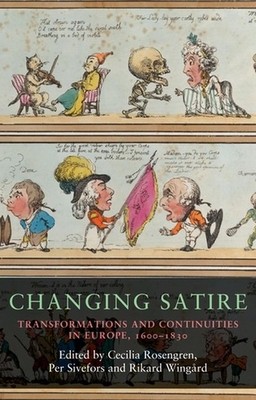
- We will send in 10–14 business days.
- Publisher: Manchester University Press
- ISBN-10: 1526146118
- ISBN-13: 9781526146113
- Format: 14 x 21.6 x 2.9 cm, hardcover
- Language: English
- SAVE -10% with code: EXTRA
Changing Satire (e-book) (used book) | bookbook.eu
Reviews
Description
This edited collection brings together literary scholars and art historians, and maps how satire became a less genre-driven and increasingly visual medium in the seventeenth through the early nineteenth century. Changing satire demonstrates how satire proliferated in various formats, and discusses a wide range of material from canonical authors like Swift to little known manuscript sources and prints. As the book emphasises, satire was a frame of reference for well-known authors and artists ranging from Milton to Bernini and Goya. It was moreover a broad European phenomenon: while the book focuses on English satire, it also considers France, Italy, The Netherlands and Spain, and discusses how satirical texts and artwork could move between countries and languages. In its wide sweep across time and formats, Changing satire brings out the importance that satire had as a transgressor of borders.
EXTRA 10 % discount with code: EXTRA
The promotion ends in 16d.14:34:23
The discount code is valid when purchasing from 10 €. Discounts do not stack.
- Publisher: Manchester University Press
- ISBN-10: 1526146118
- ISBN-13: 9781526146113
- Format: 14 x 21.6 x 2.9 cm, hardcover
- Language: English English
This edited collection brings together literary scholars and art historians, and maps how satire became a less genre-driven and increasingly visual medium in the seventeenth through the early nineteenth century. Changing satire demonstrates how satire proliferated in various formats, and discusses a wide range of material from canonical authors like Swift to little known manuscript sources and prints. As the book emphasises, satire was a frame of reference for well-known authors and artists ranging from Milton to Bernini and Goya. It was moreover a broad European phenomenon: while the book focuses on English satire, it also considers France, Italy, The Netherlands and Spain, and discusses how satirical texts and artwork could move between countries and languages. In its wide sweep across time and formats, Changing satire brings out the importance that satire had as a transgressor of borders.


Reviews